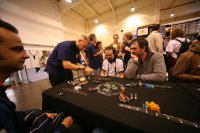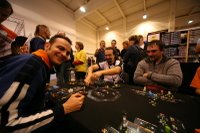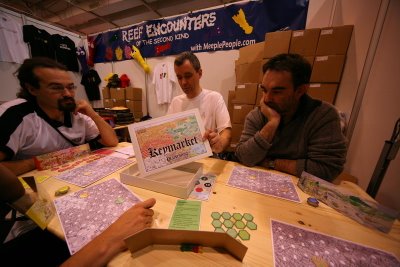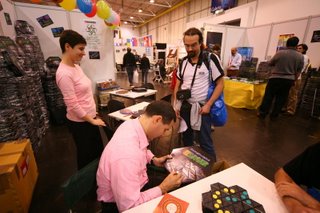Hi all
here is my personal contribution to the reviewr buisness: a small Vademecum with some suggestions and highlights that I have wrote for
La tana dei GoblinI'm sorry but it is still only in Italian.
Vademecum del Buon RecensoreSbrodolata introduttivaScrivere una recensione è una cosa spesso assai più complessa e dispendiosa di quanto si possa pensare a prima vista, ma è anche una cosa che da una certa soddisfazione, soprattutto quando si riesce nel difficile compito di trasmettere ai lettori le proprie impressioni su un gioco riuscendo però al tempo stesso a dare una descrizione obbiettiva del medesimo, utile per chi vuole capire di cosa si sta parlando e anche a quelli che già conoscono il gioco per vedere confermate le proprie impressioni o magari per trovare un punto di vista differente sul quale ragionare.
Senza scendere nella bassa e becera denigrazione o nella sviolinata incontrollata, il buon recensore deve riuscire a lasciar affiorare le sue caratteristiche e i suoi gusti, proprio perché una recensione non deve e non può essere una descrizione completamente oggettiva di un gioco (c'è il regolamento per questo), ma è piuttosto una descrizione filtrata dalle sensazioni ed impressioni che il gioco ha suscitato nel recensore.
E' bene cercare di dare uno stile omogeneo alle proprie recensioni: è bello e utile quando nel leggere una tua recensione i lettori ti vedono e ti riconoscono in essa. Bello perché crea un rapporto diretto, meno freddo e distaccato, quasi personale e amichevole. Utile perché tutela il lettore che, leggendo e riconoscendo le tue recensioni, impara a comprendere i tuoi gusti ed il tipo di giochi che preferisci.
Esempio pratico
Ho giocato a CiccioPasticcio e il gioco mi ha davvero deluso perché le meccaniche proprio non girano, cosa scrivo?
Recensore sanguigno: Ho giocato a CiccioPasticco ed il gioco proprio mi ha deluso. Non funziona, non gira: l'autore poteva risparmiarci questa ennesimo gioco pacco!
Recensore avveduto: Ho giocato a CiccioPasticcio ed ho trovato che nella fase A il gioco scorre male e tende a piantarsi, sopratutto quando si è in 4 giocatori. Sarebbe stata necessaria una regolina che facilitasse lo Zippaggio dei CabloBlocchi.
Effetti. Il primo recensore butta in faccia al lettore le sue impressioni senza curarsi di dare informazioni e strumenti per capire e spiegare, la recensione è di scarsa utilità e la sola informazione chiara è che al recensore non è piaciuto quel gioco, ma non si capisce perché (magari il gioco è bellissimo ma lui ha litigato con l'autore). Il secondo recensore circoscrive la sua critica ad aspetti ben precisi e comprensibili, che il lettore può poi condividere o meno a secondo del suo giudizio personale (magari lui è un fanatico dello Zippaggio dei CabloBlocchi fatto in maniera legnosa), risultando nel complesso assai più utile in ogni caso.
E' necessario avere sotto mano il gioco e le regole?In linea di massima per scrivere una recensione ben fatta è consigliabile avere il gioco ed il suo regolamento sottomano, anche se lo si conosce molto bene e lo si è giocato molte volte. Vi accorgerete infatti che spesso occorre fare riferimento a termini usati nel regolamento, o ai componenti e materiali del gioco ed è sempre bene usare una terminologia omogenea e, per quanto possibile, che sia la stessa del manuale.
Avere il gioco fra le mani quando si scrive la recensione è anche importante per altre ragioni, come stilare l'elenco dei componenti, le lingue del regolamento, l'autore, la casa editrice e tante altre cose che, qualora non sia già presente una scheda tecnica, dovrete comunque scrivere.
Esempio pratico
Nel regolamento c'è scritto che il gioco si svolge in vari turni, dove ciascun turno di gioco è diviso in fasi e in ogni turno un giocatore ha 4 Punti Energia in totale da poter spendere.
Recensore sprovveduto: Nella prima azione del turno se il giocatore spende tutti i suoi punti azione non potrà poi usufruirne dopo o nel turno successivo.
Recensore preparato: Se il giocatore spende tutti i Punti Energia a sua disposizione nella prima fase del suo turno di gioco, non ne potrà poi spendere nelle fasi successive dello stesso turno.
Effetti. Il primo recensore genera una confusione totale nel lettore: a parte la costruzione stessa della frase, cosa sono i "punti azione"? e cos'è "la prima azione del turno"? Il regolamento parla invece di Punti Energia e fasi del turno di gioco. Il secondo recensore è attento, usa la stessa terminologia del regolamento, compreso l'uso delle maiuscole nello scrivere "Punti Energia".Esempio Pratico
Il regolamento del gioco parla di Territori divisi in Regioni. In ogni regione ci sono dei villaggi e dei castelli.
Recensore disattento: Ogni giocatore può spostarsi da una zona a quella adiacente ed occupare il castello che trova, a patto che parta da un suo insediamento.
Recensore accurato: Ogni giocatore può spostarsi da una Regione a quella adiacente di uno stesso Territorio o di uno differente ed occupare il castello che vi trova, a patto che sia partito da un suo castello o da un suo villaggio.
Effetti. Il primo recensore è impreciso al punto da indurre un dubbio nel lettore quando dice "spostarsi da una zona a quella adiacente": si riferisce forse alle Regioni, o ai Territori? Se avesse utilizzato la stessa terminologia del regolamento, come il secondo recensore, non vi sarebbero dubbi.Qual'è il giusto livello di dettaglio?Una recensione non deve essere una trasposizione fedele del regolamento di gioco, che non avrebbe senso, ma piuttosto una sua sintesi interpretata, che non tralasci le cose importanti pur senza addentrarsi nei più minimi dettagli. Dovrebbe essere una descrizione del fluire del gioco guidata dal regolamento, con commenti ed osservazioni pertinenti nella varie fasi ed ai vari elementi. Il livello di dettaglio è sempre a discrezione del recensore, ma è evidente che una recensione di poche righe è indubbiamente scarsa e poco utile, mentre una di quattro pagine potrebbe spaventare anche il più appassionato, anche se accurata e dettagliatissima.
Nella scelta del livello di dettaglio da adottare in una recensione, è possibile fare riferimento ad una regola empirica basata sul tenere a mente il motivo principale per cui si scrive una recensione: far capire di cosa tratta il gioco e come funziona senza riscrivere il regolamento e dando una propria visione delle cose. E' sufficiente infatti chiedersi di tanto in tanto "quel che ho scritto è sufficiente a questo scopo o manca qualcosa?" oppure "quel che sto scrivendo, è davvero indispensabile oppure può essere tralasciato senza rendere monca la mia recensione?", per riuscire a mantenersi su un equo livello di dettaglio.
Esempio pratico
Nel gioco, nella fase 1 del turno, si possono compiere 4 azioni normali, ognuna con diverse caratteristiche, e 12 azioni speciali, a seconda della casella occupata dal giocatore.
Recensore niubbo: Nella prima fase di gioco il giocatore può scegliere una delle quattro azioni qua di seguito elencate: muoversi di una casella e raccogliere, muoversi di tre caselle, raccogliere e basta o saltare. Se si trova sulla casella di acqua può anche [...], se si trova sulla casella di prato può anche [...], ...
Recensore sagace: Nella prima fase del proprio turno, il giocatore può effettuare una serie di azioni, alcune delle quali sono fisse, mentre altre dipendono dalla casella occupata. L'insieme delle azioni possibili permette essenzialmente di scegliere se muoversi con rapidità, andando così ad occupare posizioni interessanti per i turni successivi, o muoversi poco o niente raccogliendo però i Margheritoni presenti nella casella. Ovviamente sulle caselle particolari si aprono per il giocatore diverse possibilità che sono l'aspetto più peculiare di questo gioco e che rendono vario il fluire dei turni. Effetti. Nella ricerca di un dettaglio eccessivo, il primo recensore annoia il lettore in una fredda elencazione delle varie azioni possibili, che allunga senza reale necessità la recensione, interrompendo inoltre un ideale filo narrativo. Il secondo recensore riesce nell'internto di far capire gli aspetti peculiari e la varietà di azioni del gioco senza ricorrere alla lista, mantenendo un gradevole filo narrativo che mantiene il lettore attento e interessato.
Quanto mi posso sbilanciare nei miei commenti e giudizi?E' sempre bene, alla fine della recensione, raccogliere sinteticamente le proprie impressioni generali in un breve trafiletto riassuntivo conclusivo, utile per tirare le somme sul gioco. Questo accorgimento risulta utile, elegante e non in disaccordo con lo schema Pregi/Difetti che dovrete comunque dare alla fine e che risulta utile per chi non ha voglia o tempo di leggere l'intera recensione.
Non va dimenticato infatti che il modo migliore per farsi un'idea del gioco è leggere ciò che il recensore ha scritto, seguire il discorso ed il filo logico della sua recensione in modo da capire e dare il giusto valore a critiche e punti di forza individuati. Il breve trafiletto conclusivo di riassunto è quindi in genere il modo ottimale per concludere il discorso.
Esempio pratico
Il gioco CablaLaCasa mi è piaciuto molto, ho scritto la recensione ma non so come concluderla.
Recensore affaticato: CablaLaCasa mi è piaciuto: giocone.
Recensore attento: Nel complesso CablaLaCasa mi ha proprio soddisfatto; al di là dell'ambientazione originale (pochi giochi sono riusciti a parlare di questo difficile tema con la stessa efficacia) il gioco scorre bene, è divertente e spesso coinvolgente. Gli imprevisti che causano i blackout e la presenza inquietante del Grande Scarafaggio riescono a rendere il gioco avvincente fino alla fine. La possibilità di usare carte Idraulico anche nel turno degli avversari annulla i tempi morti che potrebbero essere un difetto di questo gioco. Unica pecca forse i materiali: invece di counter di cartoncino sarebbe stato bello qualcosa di più evocativo per i personaggi che animano il set di CablaLaCasa.
Effetti. Il primo recensore non sa come concludere la sua recensione, è stanco o non ha più voglia di scrivere così taglia breve e chiude con una frase che non aggiunge nulla di interessante e dà un'impressione di inaccuratezza generale che si evidenzierà probabilmente anche in una stringatissima sezione Pregi/Difetti. Il secondo si preoccupa di concludere il suo discorso in modo coerente, sintetizzando le sue opinioni e aggiungendo in effetti qualcosa di utile, potrà anche permettersi di essere più schematico nella sezione Pregi /Difetti senza rischiare di passare per inaccurato.
Ma devo averlo giocato il gioco per fare una recensione?La domanda può sembrare banale ma non è certo una novità che vi siano anche recensori che si lanciano in descrizioni appassionate di meccaniche, pregi e difetti di un gioco senza averlo mai giocato o avendo fatto magari una sola partita. Spesso, questi recensori sono facilmente soggetti a errori, imprecisioni, interpretazioni anche opposte a quelle corrette, e difficilmente hanno i mezzi per controbattere o rimediare laddove queste cose gli vengano segnalate. E' quindi chiaro che come regola generale per scrivere bene una recensione sia necessarioaver provato il gioco per benino.
Esistono tuttavia persone che hanno una cultura ed un'esperienza di gioco sufficientemente variegate e lunghe da essere in grado di cogliere gli aspetti più importanti di un gioco anche dalla prima partita, o addirittura leggendone solo il regolamento. In questi casi le loro indicazioni in una recensione possono essere comunque utili ai lettori, l'importante è rendere esplicito in qualche modo all'interno della recensione il vostro livello di conoscenza del gioco.
Vi suggeriamo inoltre di non lanciarvi in azzardati paragoni e asserzioni definitive se la vostra conoscenza ludica non è appropriata, le brutte figure sono difficili da cancellare dalla memoria dei lettori, che potrebbero conservare a lungo un'idea poco "professionale" di voi come recensori!
Esempio pratico
Si parla del bellissimo FrustaLaChiappa, gioco appena uscito sulle corse di bighe con un sistema di movimento a carte. In realtà il tema è stato affrontato già molte volte, anche in titoli di comprovato successo, e la meccanica di movimento non è per nulla originale poiché esistono molti giochi che la usano.
Recensore sbruffone e poco esperto: FrustaLaChiappa mi ha in definitiva colpito per l'ambientazione originalissima e la meccanica del movimento con le carte invece che con i dadi, una geniale trovata che potrebbe condizionare molti altri giochi di prossima uscita!
Recensore attempato: Nonostante rientri nella categoria ampiamente sfruttata di giochi sulle corse di bighe utilizzando peraltro una meccanica di movimento non certo originale, FrustaLaChiappa riesce comunque a colpire e risulta in definitiva un gioco molto divertente.
Ortografia e punteggiatura... ahiahiahi!Niente paura, non intendiamo far tornare a scuola nessuno, tuttavia non possiamo trascurare questo punto. Scrivere un italiano corretto è importante, spesso delle belle idee possono essere annullate da un modo di scrivere disattento, frettoloso e magari scorretto. Fortunatamente, anche se non ricordiamo tutte le regole della grammatica, abbiamo tanti correttori a disposizione sui nostri computer o su internet, che possono darci una mano. Prima di pubblicare sarebbe sempre buona norma scrivere da parte la nostra recensione e farla passare per uno di questi correttori. Non dimentichiamo che con una recensione l'idea che il lettore si fa di noi è basata su come scriviamo, e se scriviamo male...
Una considerazione a parte merita la punteggiatura. Anche se scriviamo un buon italiano senza fare errori di ortografia, possiamo rendere il tutto incomprensibile o dare alle frasi significati anche opposti a quelli desiderati se non utilizziamo bene la punteggiatura! Ricordiamoci che le virgole impongono delle pause e permettono di racchiudere degli incisi, usiamo il punto per chiudere frasi troppo lunghe, o il punto e virgola per spezzarle. Ricordiamoci che i segni di punteggiatura e le parentesi vanno attaccati alla parola che li precede e separati da uno spazio rispetto a quella che segue. Soprattutto, proviamo a rileggere ciò che scriviamo per sentire se "suona" bene, ci accorgeremo così anche delle fastidiose ripetizioni che sono sempre da evitare quando è possibile.
Come detto sopra, non è il caso di rimandare a scuola nessuno, ma se vi sentite poco sicuri o volete cercare di migliorare il vostro stile, la cosa migliore è eleggere un modello da seguire (un giornalista che vi piace, un nostro recensore, chi volete), analizzando il suo modo di scrivere potreste capire come migliorare il vostro.
ConclusioniSperiamo che questo piccolo vademecum possa esservi utile per affrontare con consapevolezza e competenza il duro lavoro del recensore che, come detto all'inizio, comporta un notevole impegno in termini di tempo e preparazione, ma conferisce al tempo stesso grandi soddisfazioni. Non c'è dubbio che mano a mano che si renderà necessario potremo aggiungere altre considerazioni a questo "manualetto del bravo recensore", l'importante è che ciascuno capisca che si tratta di suggerimenti e non di imposizioni: è più che giusto che ognuno trovi il proprio stile personale, ci mancherebbe!
Non vorremmo avervi spaventati con considerazioni troppo pretenziose: siamo dell'opinione che anche un giocatore non esperto possa scrivere una bella recensione e che il suo commento e contributo siano molto importanti, a patto che affronti la cosa con la dovuta consapevolezza e conscio che il mondo del gioco è molto più popolato e variegato di quanto ci si possa aspettare.
Scrivere delle buone recensioni è utile a tutti. Per chi cerca informazioni sui giochi, perché può trovarne e capirle. Per chi produce i giochi, perché può capire da esse cosa si può migliorare e proporre di nuovo. Per chi come noi prova soddisfazione nel fornire un servizio utile agli altri e lo fa senza fini di lucro, avendo come unico ritorno l'immagine di noi che costruiamo di giorno in giorno con queste iniziative. Scrivere delle buone recensioni è utile a tutti, quindi, scriviamole bene!
Buon gioco a tutti, e... buone recensioni!
by Liga with the help of The Goblin!
 Hi all
Hi all





